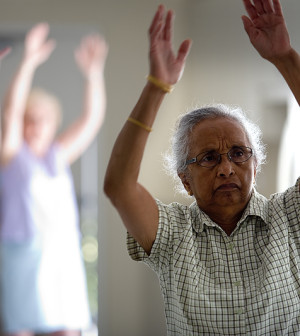- Could Your Grocery Store Meat Be Causing Recurring UTIs?
- Are You Making This Expensive Thermostat Error This Winter?
- Recognizing the Signs of Hypothyroidism
- 10 Strategies to Overcome Insomnia
- Could Artificial Sweeteners Be Aging the Brain Faster?
- Techniques for Soothing Your Nervous System
- Does the Water in Your House Smell Funny? Here’s Why
- Can a Daily Dose of Apple Cider Vinegar Actually Aid Weight Loss?
- 6 Health Beverages That Can Actually Spike Your Blood Sugar
- Treatment Options for Social Anxiety Disorder
Parenthood May Push Cancer Patients to Seek More Treatment


Being a parent makes cancer patients more likely to seek life-extending treatments, a new study says.
The study included 42 parents with advanced cancer. The average age of the patients was 44. The average age of their children was 12.
The patients were asked how being a parent affects their treatment decisions. Nearly two-thirds said being a parent motivated them to find ways to extend their lives, mainly so that they could have more time with their children.
Other factors in treatment decisions included being able to continue their parental duties (15 percent) and being able to receive treatment close to their families (12 percent), according to the study.
“Numerous psychosocial factors influence patients’ decisions about cancer treatment. It’s important for patients with dependent children to discuss their treatment priorities with their oncologist, who may not know, for example, how important it is for a patient with children to preserve their functioning at home,” lead author Devon Check, a Ph.D. student at the University of North Carolina at Chapel Hill, said in a news release from the American Society of Clinical Oncology.
Just over half of patients said they would be interested in hospice services. Many of those interested in hospice viewed it as a source of support for their families. Some wanted institutional hospice care in order to protect their children from seeing them die at home, according to the researchers.
Twenty-four percent of the patients were interested in receiving palliative care at the same time as their cancer care, the study found.
The study will be presented at an American Society of Clinical Oncology meeting in Boston on Oct. 18. Findings presented at meetings should be viewed as preliminary until they’ve been published in a peer-reviewed journal.
“We hope that our study can help oncologists engage patients with children in shared decision making and promote alignment of the treatment plan with the patients’ priorities, including family responsibilities,” Check said.
The researchers are planning a larger study to better understand the needs of parents with advanced cancer.
More information
The American Academy of Family Physicians has more about cancer treatment.
Source: HealthDay
Copyright © 2026 HealthDay. All rights reserved.










